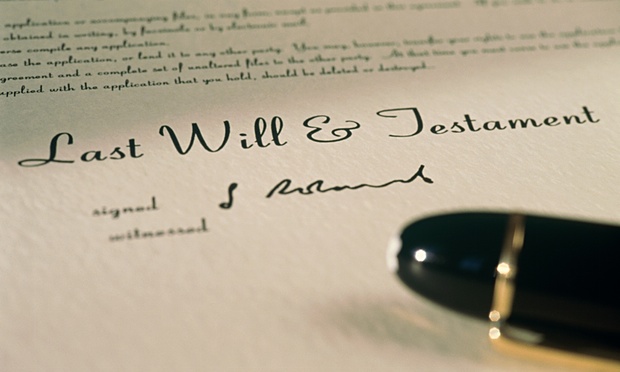The Succession Act, 1965 protects surviving spouses of deceased persons by affording considerable protection as the Act restricts the right of the testator to leave his/her property to whoever he/she wishes.
Spouses’ Rights under the Succession Act, 1965
Section 111 of the Succession Act, 1965 states:
| 111.—(1) If the testator leaves a spouse and no children, the spouse shall have a right to one-half of the estate. | ||
| (2) If the testator leaves a spouse and children, the spouse shall have a right to one-third of the estate. |
The estate to which the surviving spouse is entitled to a share in is ‘net estate’ which is ‘all estate…not ceasing on his death’. So this excludes trust property, joint property passing by survivorship, property in which the deceased had a limited interest, and validly nominated property (credit union accounts, post office saving certificates, nominated pension schemes).
Costs, liabilities and expenses also need to be taken into account to leave a net estate figure. It is this figure that the spouse is entitled to either one half of (no children) or one third of (children).
In summary, the legal right share is calculated on the net estate of the testator ie all property less expenses, debts, and liabilities.
Legal Right Share
This entitlement is called the ‘legal right share’ which only applies in a testate situation, that is where there is a will.
In an intestate situation, that is, there is no will, the surviving spouse is entitled to two thirds of the estate if the deceased has children; if the deceased has no children, the surviving spouse is entitled to the entire estate.
‘Children’ included for the purposes of section 111 above include
- Children of his blood, both marital and non-marital
- Children validly adopted by him.
It does not include
- Step children
- Foster children
- Children for whom he acted in loco parentis
The right of the surviving spouse to the legal right share ranks after the rights of creditors of the deceased but before all other beneficiaries.
Section 112 of the Succession Act, 1965 states:
112.—The right of a spouse under section 111 (which shall be known as a legal right) shall have priority over devises, bequests and shares on intestacy.
Legal Right Share Versus Bequest?
Section 114 (2) of the Succession Act, 1965 states that
(2) In any other case, a devise or bequest in a will to a spouse shall be deemed to have been intended by the testator to be in satisfaction of the share as a legal right of the spouse.
If this situation occurs and the testator dies fully testate, then the surviving spouse will have a choice to make as set out in section 115 of the Act which provides for the surviving spouse to elect to between the legal right share entitlement and the rights under the will.
| 115.—(1) (a) Where, under the will of a deceased person who dies wholly testate, there is a devise or bequest to a spouse, the spouse may elect to take either that devise or bequest or the share to which he is entitled as a legal right. | ||
| (b) In default of election, the spouse shall be entitled to take under the will, and he shall not be entitled to take any share as a legal right. |
If the surviving spouse does not elect to take either the bequest or the legal right share, he/she will be deemed to have taken the bequest and will lose the legal right share.
Where a testator dies partly testate and partly intestate the calculation is more complex and the following will need to be calculated-the value of the net estate, the value of all bequests under the will, and the value of the intestate part of the estate.
Section 115, Succession Act, 1965
| (2) (a) Where a person dies partly testate and partly intestate, a spouse may elect to take either— | ||
| (i) his share as a legal right, or | ||
| (ii) his share under the intestacy, together with any devise or bequest to him under the will of the deceased. | ||
| (b) In default of election, the spouse shall be entitled to take his share under the intestacy, together with any devise or bequest to him under the will, and he shall not be entitled to take any share as a legal right. |
Appropriation of the Family Home in favour of a Surviving Spouse
Section 56 provides for the right of surviving spouse to require dwelling and household chattels to be appropriated.
This section provides for the surviving spouse to request the personal representative to appropriate the dwelling in which the surviving spouse ordinarily resides if this property is part of the estate of the deceased person. This appropriation will be towards the satisfaction of his/her legal right share. (There are certain restrictions on this right to appropriate which are set out in subsection 5)
Spouse no longer a spouse?
There are 4 ways by which a spouse ceases to be a spouse for Succession Act, 1965 purposes.
a) Renunciation
Section 113 provides for renunciation before or after marriage by way of a written contract.
b) Separation
The Judicial Separation and Family Law Reform Act, 1989 and the Family Law Act, 1995 can provide for property adjustment orders and the extinguishment of succession rights.
c) Divorce
The Family Law (Divorce) Act, 1996 and the subsequent marriage of a testator will have important implications here. For example, a will is revoked by the subsequent marriage of a testator.
d) Unworthiness to succeed
Section 120 of the Succession Act, 1965 provides for the unworthiness of the surviving spouse to succeed. An example of this situation is the ‘Catherine Nevin/Jack Whites Pub’ case: In Re Nevin, High Court, 1997.
What happens when a surviving spouse takes his/her legal right share?
It blows the will out of the water. And there is no compensation for aggrieved beneficiaries who lose out as a result.
Children’s Rights
Unlike spouses, children are not entitled to any specific share in a deceased person’s estate.
Testate
Accordingly, in a testate situation, a child is only entitled to whatever the will of the deceased says.
Intestate
In an intestate situation a spouse is entitled to two thirds of the estate with the one third going to the ‘issue’. ‘Issue’, for the purposes of the Succession Act, 1965, includes marital and non-marital children, adopted children and their lineal descendants. Step children and foster children are not included.
Types of Children
A testator may have a number of different types of children eg
- marital children
- unborn children
- section 98 children (see below)
- non-marital children
- adopted children
- step children
- foster children.
Section 98 Children
It is worth noting the provisions of section 98 of the Succession Act, 1965. It provides that where a child predeceases a testator leaving issue at the time of death, the gift from the testator will not lapse but will take effect as if the death of that child occurred after the death of the testator, unless a contrary intention appears from the will.
This means that if a testator’s child predeceases him leaving grandchildren, any benefit that would have been received by the child will pass to his estate.
Actions that a Child Can Take Against an Estate
The first action to look at is a ‘section 117′ action. Section 117 of Succession Act, 1965 provides:
| 117.—(1) Where, on application by or on behalf of a child of a testator, the court is of opinion that the testator has failed in his moral duty to make proper provision for the child in accordance with his means, whether by his will or otherwise, the court may order that such provision shall be made for the child out of the estate as the court thinks just. | ||
| (2) The court shall consider the application from the point of view of a prudent and just parent, taking into account the position of each of the children of the testator and any other circumstances which the court may consider of assistance in arriving at a decision that will be as fair as possible to the child to whom the application relates and to the other children. | ||
| (3) An order under this section shall not affect the legal right of a surviving spouse or, if the surviving spouse is the mother or father of the child, any devise or bequest to the spouse or any share to which the spouse is entitled on intestacy. | ||
| (4) Rules of court shall provide for the conduct of proceedings under this section in a summary manner. | ||
| (5) The costs in the proceedings shall be at the discretion of the court. | ||
| (6) An order under this section shall not be made except on an application made within twelve months from the first taking out of representation of the deceased’s estate. |
The Court will consider the situation from the perspective of a prudent and fair parent and must consider the position of the other children of the testator also.
The time limit for bringing an action under section 117 is 6 months and this is a strict limit.
The critical test for success of a section 117 challenge is
- whether the parent positively failed in his moral duty to make proper provision for the child and
- the child must establish that he/she had a need which the testator could have satisfied in making his will.
A court cannot make an order which will interfere with the legal right share of the surviving spouse.
The second type of action is a ‘section 63′ action. Section 63 of the Succession Act, 1965 deals with advancements to children and allows a child to bring a case against a child who has previously received an advancement during the testator’s lifetime. This action will seek to have the previous advancement to a sibling taken into account in the distribution of the estate on death.
If this action is successful, it will clearly impact on the distribution of the estate.
Proprietary Estoppel
The third type of action that can be taken by a disappointed child is a proprietary estoppel action. A proprietary estoppel action will aim to prove that the child acted to his detriment in the belief that he would be given a right to the deceased’s property and the deceased knew and encouraged this belief.
This is a very difficult action to succeed with.
However, if it is successful and an equitable interest has been established, it will prevail over the legal right share of the spouse and the claims of other children sharing the estate, unlike a successful section 117 action.
Underage Children and Wills
If there is a bequest to a child (an underage child) and there are no trustees appointed in the will, or where an underage child inherits on intestacy, the legal personal representative has a problem: there is nobody to whom the legal personal representative can vest the asset and there is nobody from whom he can obtain a receipt.
This is why it is advisable to insert a trust in a will where the beneficiaries may include under age children.
However if this does not occur, section 57 of the Succession Act, 1965 allows the personal representative to appoint trustees. Also, if the personal representatives do not appoint trustees then they will be trustees for the purposes of this section.
Section 57:
57.—(1) Where an infant is entitled to any share in the estate of a deceased person and there are no trustees of such share able and willing to act, the personal representatives of the deceased may appoint a trust corporation or any two or more persons (who may include the personal representatives or any of them or a trust corporation) to be trustees of such share for the infant and may execute such assurance or take such other action as may be necessary for vesting the share in the trustee so appointed. In default of appointment the personal representatives shall be trustees for the purposes of this section.
Section 58 is of assistance where a child becomes entitled to land on intestacy:
(2) Where an infant becomes entitled to any estate or interest in land on intestacy and consequently there is no instrument under which the estate or interest of the infant arises or is acquired, that estate or interest shall be deemed to be the subject of a settlement for the purposes of the Settled Land Acts, 1882 to 1890, and the persons who are trustees under section 57 shall be deemed to be the trustees of that settlement.
One other piece of legislation should be considered when dealing with children and wills:
- The Guardianship of Infants Act, 1964 which allows a parent by deed or will to appoint another person to be a guardian after death. This is a testamentary guardian and only comes into effect after the death of the testator.
Tax Status of a Child
Step children and foster children are not considered “children” for the purposes of the Succession Act, 1965; however they are under capital acquisitions tax legislation.
By Terry Gorry Google+




